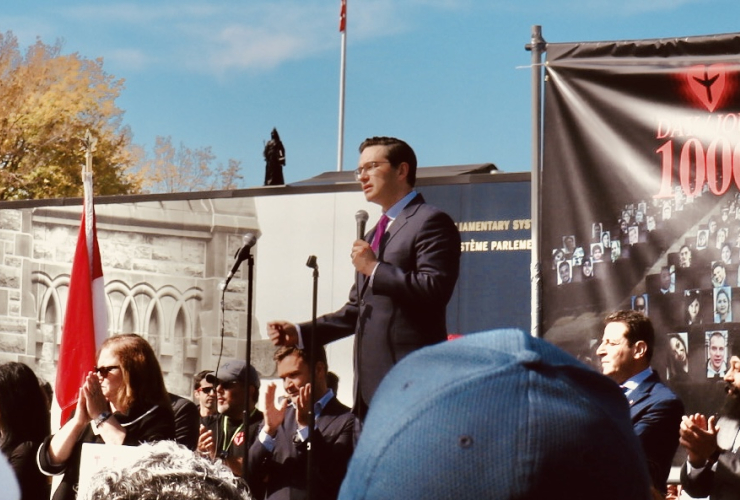At long last, some good news for Canada’s beleaguered progressives. After a summer of watching Pierre Poilievre soar in the polls and conservative premiers use the health and safety of trans kids as a wedge issue, Manitoba’s electorate delivered a refreshing change of the political seasons. Wab Kinew’s NDP won a clear majority in Tuesday’s provincial election over Heather Stefanson’s PCs, making him the first provincial premier of First Nations descent in Canadian history — a milestone that took far too long to achieve. His win also put an end to more than seven years of not-so-progressive conservative government in the province, a tenure that was punctuated by one of the most cynical and craven campaigns in Canadian political history.
That included a deliberately vague promise to expand “parental rights” in schools, a nod-and-wink to the anti-trans bills being brought forward by other conservative premiers. But that wasn’t the only culture war the Manitoba PCs were willing to wage in order to win the election. They also ran ads boasting about their refusal to look for the remains of two missing Indigenous women whose bodies are thought to be in a Winnipeg landfill and would require an extensive and expensive search to recover. “Stand firm,” the print and digital versions of Stefanson’s ad said. “For health and safety reasons, the answer on the landfill dig just has to be no.”
When it became apparent this ghoulish appeal wasn’t resonating with the voting public, the party resorted to an even stranger ad that effectively acknowledged the shame their campaign had brought on the party and its candidates. “Stand firm and vote how you feel, not how others say you should,” it said. “It’s okay to disagree on issues, without the fear of being judged.”
Manitobans weren’t buying it. In the process, they sent a message to other conservatives who think there isn’t a political cost associated with these sorts of tactics that put already vulnerable minority populations at even greater risk in the name of near-term partisan advantage. And while Saskatchewan Premier Scott Moe isn’t about to abandon his pre-emptive constitutional strike on the legal rights of his province’s children, he and other like-minded politicians might have to think twice about just how far they’re willing to go here.
Over in Victoria, for example, new BC Conservative Party Leader John Rustad used his first question in the legislature to ask about the province’s sexual orientation and gender identity program (SOGI 123), one he described as “divisive” and “an assault on parents’ rights.” As Premier David Eby noted, it was not an auspicious start. “It is outrageous that he would stand here and do this,” Eby said. “He sees political advantage in picking on kids and families and teachers and schools who are just trying to do their best for kids who are at risk of suicide. Shame on him. Choose another question.”
The ensuing 32-second standing ovation included not only Eby’s NDP colleagues but many members of the Opposition BC United caucus, including leader Kevin Falcon. There are some obvious political angles at work there, but it’s a sign that the appetite for this sort of U.S.-style culture war in Canada is not nearly as big as its proponents would like to believe.
Another sign came from Alberta, of all places. A heavily promoted event with James Lindsay, a controversial American speaker who routinely refers to the LGBT community as “groomers” and has described the Pride flag as “the flag of a hostile enemy,” was repeatedly deplatformed — first by ticketing apps like Eventbrite and then by the venues when they found out who they were hosting. Eventually, event organizers were forced to host it at an anonymous location and it drew only a few hundred mostly older people and the usual array of far-right agitators cosplaying as journalists.
These are encouraging signs, to be sure, but they’re hardly enough to put an end to the ongoing attempts by conservatives to smuggle American-style culture war politics across the border into Canada. After listing off the various depressing developments in Canada’s conservative movement — Danielle Smith’s reckless abuse of the truth, the Saskatchewan Party’s pre-emptive strike against the legal rights of LGBTQ kids and Poilievre’s ready embrace of some radical right-wing candidates — Toronto Star columnist Bruce Arthur noted that “this stuff goes in one direction, and it’s a bad direction.”
He’s right. That direction won’t change until voters make it abundantly clear conservative parties in Canada are going too far with this stuff, and that they’ll pay a real price at the ballot box for it. The defeat of Stefanson’s Progressive Conservatives, and the rejection of her odious campaign, is a start. Next year’s provincial election in Saskatchewan will be another opportunity for voters to push back against this sort of polarizing nonsense and punish a government that has been almost gleeful in its willingness to deploy it. And then, of course, there’s the federal election, whenever that comes.
But one thing should be obvious by now: If we want to keep this toxic nonsense out of our politics, we’re going to have to fight for it. The good news, as Kinew’s election victory demonstrates, is that we can win.
Small correction: Wab Kinew
Small correction: Wab Kinew is the first First Nations person to be a provincial premier, but John Norquay (Métis) was the first Indigenous premier, also of Manitoba, from 1878 to 1887.
Congratulations, Wab Kinew!
"far-right agitators
"far-right agitators cosplaying as journalists."
Ooh, nice burn!
Congratulations to Wab Kinew
Congratulations to Wab Kinew on his victory! I hope US style trumpist politics dies here in Canada.
Great result, Poilievre style
Great result, Poilievre style politics were soundly rejected! Hopefully, voters in NB will do the same in their upcoming election.






Comments